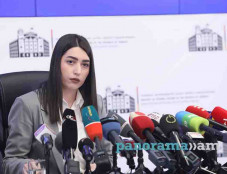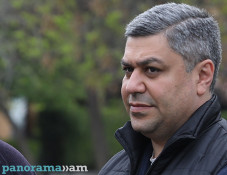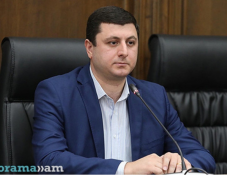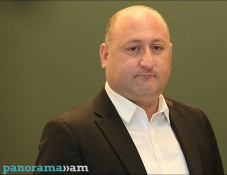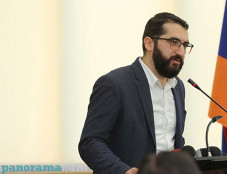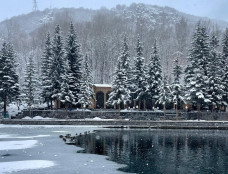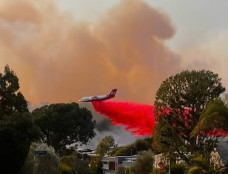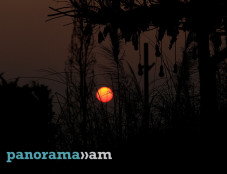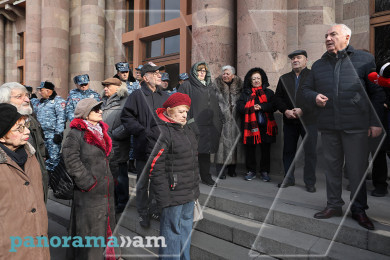Argentine Armenians rally en mass for Genocide Centennial
The Armenian community in Argentina, along with a large number of human rights organizations and political parties, marched on Friday in Cordoba and on Tuesday in Buenos Aires to commemorate and seek justice for the Armenian Genocide on its centennial anniversary, Agencia Prensa Armenia reported, according to Asbarez.
Tuesday’s march in Buenos Aires gathered more than 10,000 people and was attended by Adolfo Perez Esquivel, human rights activist and Nobel Peace Prize, Archbishop of the Armenian Apostolic Church Kissag Mouratian and Buenos Aires Legislator Pablo Ferreyra, along with all the leaders of the institutions of the Armenian community and scores of young people, children and elderly people carrying candles, flags and posters.
Adolfo Perez Esquivel, who was part of the judges of the Permanent People’s Tribunal, an organization that recognized the Armenian Genocide in 1984 and promoted its subsequent recognition by other international organizations, said that “memory can’t stay in the past; memory has to illuminate the present,” in reference to the Armenian Genocide centennial.
“In a few days, I will travel to Rome and I will meet with Pope Francis. I’ll tell him about this rally,” he concluded, receiving the cheers from everyone.
“Once again we are marching to the residence of the Ambassador of the State of Turkey, as part of the struggle we have been carrying out a century ago the descendants of the victims, for the recognition, repair and conviction of those responsible: the Turkish state, and all those countries who collaborated before, during, and after the genocide,” said Razmig Nalpatian, representing the Commemorative Commission of the Armenian Genocide Centennial on behalf of all institutions of the Armenian community.
“In our country, human rights organizations, led by our Madres and Abuelas de Plaza de Mayo, who fought relentlessly for nearly four decades for memory, truth and justice, gained victories that put us at the forefront in the matter of human rights,” he said in his speech.
“We are aware that Turkey is not alone in carrying out the last stage of genocide: denial. Its main partner is the Republic of Azerbaijan,” he added. “We wonder how different would have been the history of the twentieth century if the genocide against the Armenians had not gone unpunished.”
“Our country has recognized the Armenian Genocide by all three branches of government,” said Aram Ter Akopian, member of the Armenia Youth Federation of South America, one of the organizers of the march. “In 2006 the Congress passed Law 26,199 declaring all April 24 as ‘Day of Tolerance and Respect among Peoples’ and in 2007 the executive branch, headed by President Nestor Kirchner promulgated it. On the other hand, in 2011 the judiciary established that the Turkish State ‘committed the crime of genocide against the Armenian people,’” added Ter Akopian.
Andrés Ohanessian, member of Liga de Jovenes of the Armenian General Benevolent Union, said that “the force that had the recognition of Pope Francis led many people to mobilize worldwide.”
The main event at the Luna Park stadium will be held on Wednesday, April 29, with the leading of the renowned journalist Alejandro Fantino and a presentation of the artist Jairo, who will perform songs of Charles Aznavour.
A few days before the rally in Buenos Aires, on April 24, over 10,000 people marched in the center of the city of Cordoba, Argentina, for the Armenian Genocide centennial. The rally ended with a “Concert for Peace” with the presentation of the renowned band Bersuit Vergarabat.
The march was attended by the Deputy Mayor of the City of Córdoba, government officials, politicians and journalists. “We feel the company of all the people of Cordoba,” said Eduardo Torossian, President of the Armenian Community of Cordoba. “All political youth is represented here today,” he added.
Ruben Avakian, one of the organizers of the march, said that “it is a day of reflection, a day of action for tolerance, a day of awareness to the whole society and the States to assume the commitment to prevent so that this does not happen again, as well as to commit themselves to the struggle for human rights and condemn the crimes against humanity.”
In addition, Avakian remarked that “the courage of Pope Francis to set a position for us is invaluable, calling the Armenian Genocide as the ‘first genocide of the twentieth century’ while opening the Vatican archives as evidence of what truly happened.”
Newsfeed
Videos






